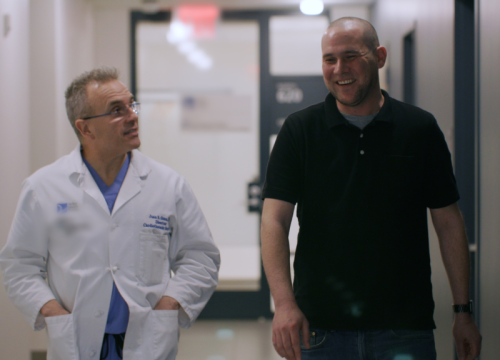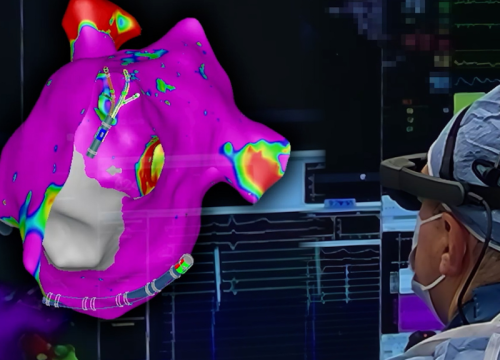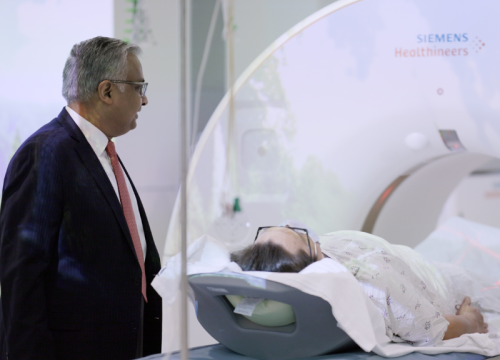Some of the most common cancers — including skin cancer, breast cancer and lung cancer — are more survivable than ever before. But these same cancers often spread to the brain, causing a type of cancer called metastatic brain cancer (also known as brain metastases or “brain mets”).
If you’ve been diagnosed with a metastatic brain tumor, you can count on Valley for expert care. We frequently help people who:
- Didn’t have symptoms of brain mets until years after their original cancer treatment
- Didn’t realize they had cancer somewhere in their body until it had already spread to their brain
- Need treatments for their original (primary) cancer and brain mets at the same time
- Were told by another provider that their metastatic brain tumor is untreatable
Metastatic Brain Tumor Symptoms
Brain metastases are the most common type of brain tumor. As they grow, they may press against (or damage) healthy brain tissue. This can cause a wide range of symptoms, including:
- Fatigue
- Headaches
- Memory problems
- Nausea or vomiting
- Paralysis
- Seizures
- Trouble speaking
- Trouble walking
- Vision problems
- Weakness
The treatments you’ll need depend on the size and location of your metastatic brain tumor, and whether it’s causing neurological symptoms.
For example, many people with small or hard-to-reach tumors undergo Gamma Knife radiosurgery. Those with symptoms caused by large tumors may benefit from brain surgery.
Metastatic Brain Cancer Care at Valley
To successfully treat brain mets, you need carefully coordinated care from a team of experts — especially if you’re receiving several cancer treatments at the same time.
At Valley, your care team may include:
- Medical oncologists who might use one type of “systemic therapy” (for example, chemotherapy, immunotherapy, hormone therapy, etc.) to treat your primary cancer, along with other drugs (such as targeted therapy or immunotherapy) to treat your brain mets
- Neurosurgeons who can either perform brain surgery or recommend an alternative to surgery, such as Gamma Knife radiosurgery
- Nurse navigators who will help take the stress out of scheduling multiple appointments with multiple providers, and can connect you to various cancer support services
- Pain management specialists who can help you control pain caused by your cancer treatments or the cancer itself
- Palliative care specialists who can help you maintain the best possible quality of life while undergoing cancer treatment
- Radiation oncologists who specialize in different types of radiation therapy for different parts of the body
Together we’ll make sure you receive the right combination of treatments in the right order, so you receive the most benefit with the fewest side effects.
Metastatic Brain Cancer Treatments
Valley’s brain tumor program offers the full range of nonsurgical and surgical treatments for brain mets. Your treatment plan may include one or more of the following:
- Medication: Some newer drugs can slow or stop the spread of brain mets. These include targeted therapy (drugs that help stop cancer cells from multiplying) and immunotherapy (drugs that help your immune system find and attack cancer cells).
- Gamma Knife radiosurgery: This noninvasive treatment for brain metastases sends targeted beams of radiation into your brain. Compared to whole-brain radiation, its pinpoint precision spares surrounding healthy tissue, resulting in significantly fewer side effects (and fewer total treatment sessions).
- Whole-brain radiation: In some cases, we use radiation therapy to treat the entire brain at once. This may be necessary if you have brain mets in more than one part of your brain.
- Brain surgery: Our neurosurgeons offer all types of surgery used to remove a metastatic tumor. We can perform “open” brain surgery with a craniotomy (we temporarily remove a piece of your skull to gain access to your brain). We also offer minimally invasive procedures that use fewer or smaller incisions.
Why Choose Valley for Metastatic Brain Tumor Care
- Advanced imaging technology: We offer state-of-the-art imaging procedures such as diffusion tensor imaging (DTI). With DTI, we can see metastatic brain cancer cells at their earliest stage — when they’re often too small to show up on standard imaging exams. We can even see “functional tracks” (wiring) within your brain, which helps us preserve the parts of your brain that control movement, speech and other abilities.
- Awake brain surgery: In some cases, we can remove brain mets while you’re awake and alert (but unable to feel pain). Your surgeon will monitor your responses, and your brain activity, while asking you questions or giving you commands. This also helps us make sure your sight, speech and other functions are still intact after surgery.
- Fluorescein-guided surgery: We can give you a harmless liquid solution that causes your brain mets to glow when viewed on a special imaging screen. This makes it easier for your surgeon to see the size, shape and location of your tumor during surgery.
- Rehabilitation and recovery: If you need help regaining certain abilities after metastatic brain cancer treatment, our physical medicine and rehabilitation team can help. Our occupational therapists can teach you easier ways to perform everyday tasks, while our physical therapists can help you improve strength and mobility. And our speech therapists can help you improve your ability to speak or swallow.
- Coordinated cancer care: If you are being treated for a primary cancer along with metastatic cancer, Valley cancer specialists work together to coordinate your treatment plan. We work with each other to make sure your treatments are timed according to a holistic plan.

















